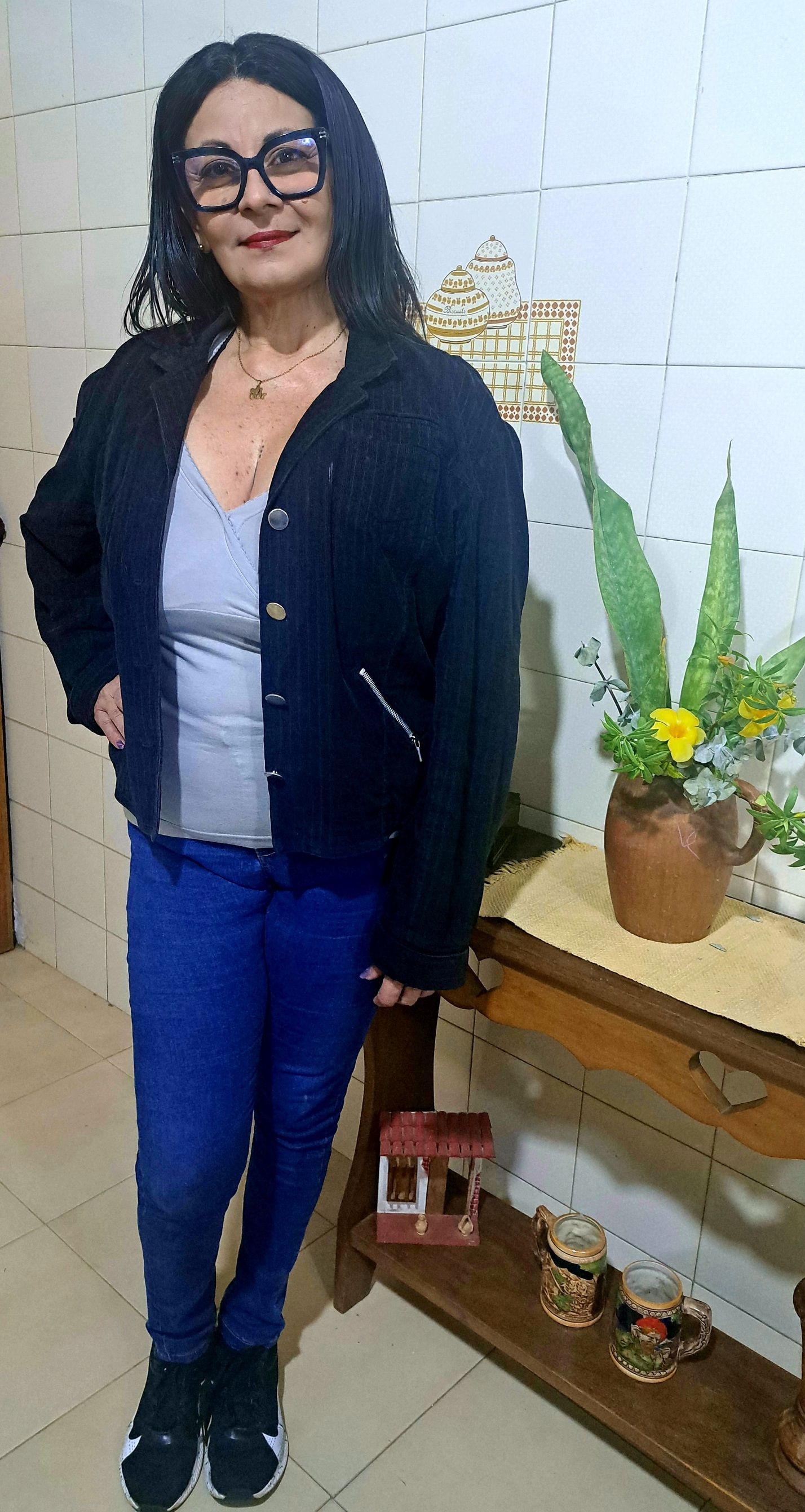
A veces nos preguntamos si somos amadas o amados. No es una pregunta fácil, pero la respuesta no está en lo que otros te dan, sino en lo que tú estás dispuesto a ver y a recibir, es explorar cómo percibimos y procesamos las reacciones que nos rodean. El amor no es solo un sentimiento; es una acción, una elección y, lo más importante, una percepción. --- Sometimes we wonder if we are loved. It is not an easy question, but the answer does not lie in what others give you, but in what you are willing to see and receive. It is about exploring how we perceive and process the reactions around us. Love is not just a feeling; it is an action, a choice, and, most importantly, a perception.

Esta es una pregunta muy profunda que va más allá de un simple "sí" o "no". Todos queremos sentirnos amados. El amor es una experiencia compleja que no siempre coincide con el hecho de que alguien nos diga "te amo". Es una percepción subjetiva que se construye a partir de acciones, palabras y gestos de la persona que escoges, pero también de tu propia capacidad para recibir ese afecto. Sentir que te aman no depende únicamente de una declaración verbal. Se manifiesta de muchas maneras, a menudo en actos sutiles que refuerzan la conexión emocional. Una persona que te ama, te escucha de verdad sin distracciones y está presente en los momentos importantes. Sientes que eres su prioridad. --- This is a very profound question that goes beyond a simple “yes” or “no.” We all want to feel loved. Love is a complex experience that does not always coincide with someone saying “I love you.” It is a subjective perception that is built on the actions, words, and gestures of the person you choose, but also on your own ability to receive that affection. Feeling loved does not depend solely on a verbal declaration. It manifests itself in many ways, often in subtle acts that reinforce the emotional connection. A person who loves you listens to you truly without distractions and is present in important moments. You feel that you are their priority.

Con pequeños actos demuestran que piensan en ti. Te preparan café, te preguntan cómo te fue en el trabajo o te ayudan cuando te sientes atareada/o. Estos gestos hablan de un cuidado sincero. Una persona que te ama respeta tus opiniones, tus límites y tus decisiones, incluso si no está de acuerdo. Valida tus sentimientos y te hace saber que tus emociones son importantes. Sientes que te respalda en tus proyectos y sueños. No te juzga por tus errores, sino que te ayuda a levantarte. Cuando te aman, te aceptan tal como eres, con tus virtudes y tus defectos, con tus luces y sombras. No intentan cambiarte para que encajes en un ideal. Tal vez estás viviendo o viviste una relación donde el otro decía amarte, pero tú no lo sientes o sentiste. A veces, el problema no es que la otra persona no nos ame, sino que su forma de expresar ese amor no coincide con la manera en que nosotros lo percibimos o lo necesitamos. Esta diferencia es una de las causas más comunes de conflicto y de la sensación de vacío en las relaciones. --- They show they care about you through small gestures. They make you coffee, ask you how work went, or help you when you're busy. These gestures show sincere care. Someone who loves you respects your opinions, boundaries, and decisions, even if they disagree. They validate your feelings and let you know that your emotions are important. You feel that they support you in your projects and dreams. They don't judge you for your mistakes, but help you get back on your feet. When someone loves you, they accept you as you are, with your virtues and flaws, your strengths and weaknesses. They don't try to change you to fit some ideal. Perhaps you are in or have been in a relationship where the other person said they loved you, but you don't feel it or didn't feel it. Sometimes the problem is not that the other person doesn't love us, but that their way of expressing that love does not match the way we perceive or need it. This difference is one of the most common causes of conflict and feelings of emptiness in relationships.

Todos tenemos una lente personal a través de la cual vemos y entendemos el afecto. Lo que para uno es una muestra de amor, para el otro puede pasar desapercibido. Puede que tu pareja demuestre su amor con actos de servicio. Quizás siempre se asegura de que tengas comida o que tu carro esté bien, porque para él o ella, cuidar de ti es la forma máxima de amor. Sin embargo, si para ti el amor se expresa con palabras de afirmación, puedes sentir la falta de un "Te quiero" sin darte cuenta de todo lo que tu pareja hace por ti. Quizás te sientes poco valorada/o, pero tu pareja cree que hace todo lo posible por ti. Se queda hasta tarde para ayudarte con un proyecto o te compra algo que querías, mientras que tú esperas que te tomen de la mano o te den un abrazo. Al no recibir el tipo de afecto que esperas, puedes llegar a la conclusión errónea de que no te ama. --- We all have a personal lens through which we see and understand affection. What is a sign of love to one person may go unnoticed by another. Your partner may show their love through acts of service. Perhaps they always make sure you have food or that your car is in good working order, because for them, taking care of you is the ultimate expression of love. However, if for you love is expressed through words of affirmation, you may feel the lack of an “I love you” without realizing everything your partner does for you. You may feel unappreciated, but your partner believes they are doing everything they can for you. They stay up late to help you with a project or buy you something you wanted, while you are hoping for a handhold or a hug. Not receiving the type of affection you expect, you may jump to the wrong conclusion that they don't love you.

Muchas veces, sin darnos cuenta, esperamos que nuestra pareja nos ame de la misma manera en que nosotros amamos. Si nuestra forma de expresar cariño es el contacto físico, esperamos que el otro nos abrace o nos acaricie a menudo. Si no lo hace, podemos interpretar que no nos quiere, cuando en realidad, esa persona puede estar mostrando su afecto de otra forma. Sentirse amado es una necesidad fundamental para el bienestar emocional. Si no lo sientes en tu relación, es importante que lo explores. ¿Es un problema de comunicación? ¿Hay una falta de coincidencia en cómo ambos expresan y reciben el amor? La respuesta a esta pregunta puede ser el punto de partida para fortalecer el vínculo y, sobre todo, para que te sientas valorada/o y querida/o. --- Often, without realizing it, we expect our partner to love us in the same way that we love them. If our way of expressing affection is through physical contact, we expect the other person to hug or caress us often. If they don't, we may interpret this as them not loving us, when in reality, that person may be showing their affection in a different way. Feeling loved is a fundamental need for emotional well-being. If you don't feel it in your relationship, it's important to explore why. Is it a communication problem? Is there a mismatch in how you both express and receive love? The answer to this question can be the starting point for strengthening your bond and, above all, for making you feel valued and loved.

Al entender que el amor puede expresarse de múltiples maneras, se abre la puerta a una conexión más profunda y genuina. La clave no es cambiar quiénes y cómo somos, sino aprender a hablar y a escuchar el "idioma del amor" del otro. El amor puede llegar a ti de distintas formas, y si no estás sintonizado con ellas, podrías estar perdiendo la oportunidad de sentirlo. ¿Qué lenguaje del amor crees que es el tuyo, y cuál el de las personas más importantes en tu vida? Invito a una autoevaluación sobre como amas y como quieres que te amén, eso ayuda a lograr esa paz emocional y bienestar que todos buscamos. Si toqué tu corazón, déjalo saber en tus comentarios. --- Understanding that love can be expressed in many ways opens the door to a deeper and more genuine connection. The key is not to change who we are and how we are, but to learn to speak and listen to each other's “language of love.” Love can come to you in different ways, and if you're not tuned in to them, you could be missing out on the opportunity to feel it. What love language do you think is yours, and what is that of the most important people in your life? I invite you to self-evaluate how you love and how you want to be loved, as this helps to achieve the emotional peace and well-being we all seek. If I touched your heart, let me know in your comments.

CREDITOS
¿Sientes que te aman? [Esp/Ing]
Web 3.0 Internet Descentralizada Hive Ecosistema PeakD C/Holos&Lotus
Cuenta @rosaortizweb3 MSc Rosa Del Valle Ortiz Mena rosaortizweb3@gmail.com Originales Textos y Fotografías
Aplicaciones PeakD, Hive.blog, C/Holos&Lotus y Traductor DeepL
Equipos/Cámaras Tecno Spark 8C Modelo Tecno KG5j Versión de Android 11 Laptop HP ProBook

Confiando siempre en Dios. @rosaortizweb3